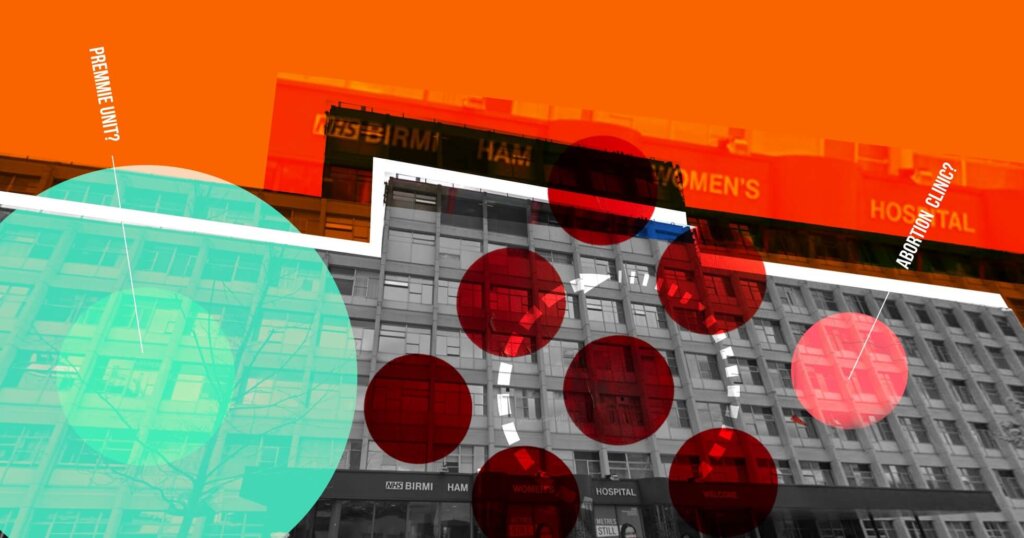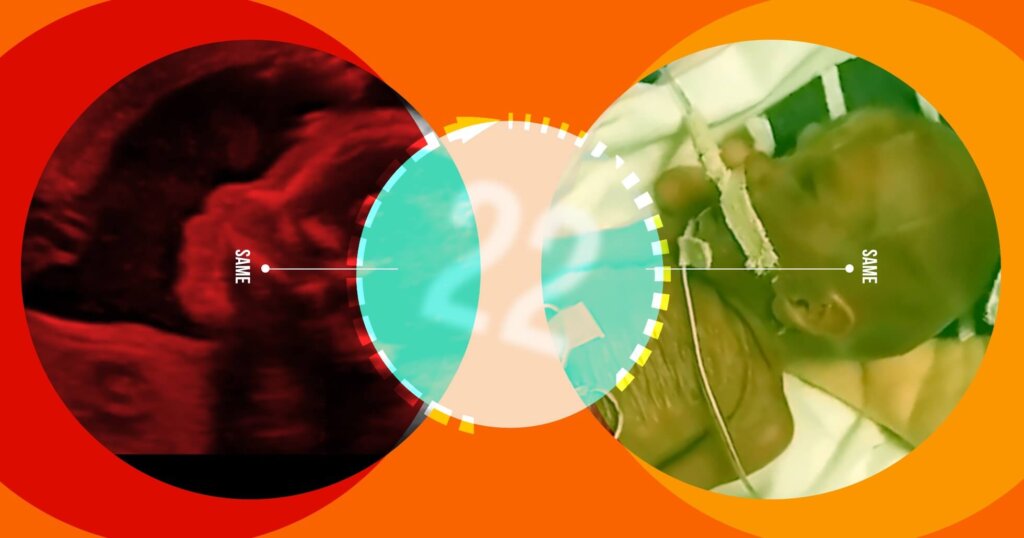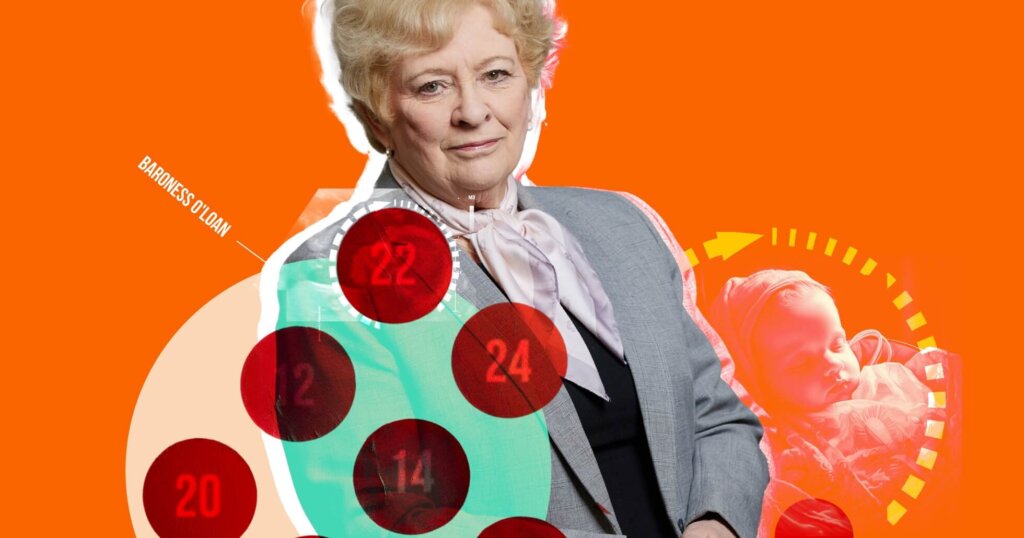On Thursday 7 December 2023, a member of the House of Lords, Baroness O’Loan, introduced the Abortion (Gestational Time Limit Reduction) Bill to the House of Lords, where it received a First Reading.
The Bill will amend the Abortion Act 1967 so that the gestational time limit for abortion that is set out in Section 1(1)(a) of the Act is reduced from 24 to 22 weeks.
A 24-week abortion limit is now past the point at which many babies survive, it is double that of the most common time limit among European Union countries and represents a contradiction at the heart of our abortion law.
Originally set at 28 weeks, the abortion limit was lowered in 1990 to 24 weeks gestation because, given our then medical and technological abilities, this was the gestational age at which an unborn baby was considered viable. Since then, however, medical technology has advanced considerably and the survival rates for unborn babies who are born before the 24-week abortion limit have improved dramatically, and babies born below 24 weeks gestation are increasingly able to survive.
Baroness O’Loan’s Abortion (Gestational Time Limit Reduction) Bill 2023 recognises this new reality and proposes, for similar reasons to the last time the abortion limit was lowered, to reduce the abortion limit from 24 to 22 weeks gestation.
A contradiction at the heart of our abortion law
There is a clear contradiction at the heart of our abortion law and current medical practice. On the one hand, the law permits ending the lives of babies at 22 and 23 weeks, and, on the other hand, current medical practice strives to save the lives of many babies born prematurely at 22 or 23 weeks gestation.
The annual abortion statistics for England and Wales in 2021 show that there were 1,054 abortions for babies at 22 and 23 weeks gestation over that year. At the same time, according to a recent study, there were a total of 261 babies born alive at 22 and 23 weeks, before the abortion limit, who survived to discharge from hospital in 2020 and 2021.
This means in the same hospital, on the same day, two babies at the same gestational age (22 or 23 weeks gestation) could have very different fates – one could have his or her life deliberately ended by abortion, and the other could be born prematurely and have a dedicated medical team provide the best care they can to try to save his or her life.

The contradiction – Birmingham Women’s Hospital performs abortions at 20-23 weeks and also provides specialist care for babies born at 23 weeks
This is not mere speculation as a number of hospitals in England provide specialist care for extremely premature babies, usually those born before 27 weeks gestation, and also perform late-term abortions, between 20 and 23 weeks. According to statistics released by the Department of Health and Social Care, between 2018 and 2021 (2018, 2019, 2020, 2021), Birmingham Women’s Hospital performed 143 abortions where the baby was between 20 and 23 weeks gestation in 2021. At the same time, their neonatal intensive care unit “provides intensive care to premature babies born as early as 23 weeks”. This means in this hospital in Birmingham, there could be doctors at one end of the hospital fighting to a keep baby born at 23 weeks gestation alive, and, at the other end of the hospital, there could be other doctors ending the life of a baby at 23 weeks gestation through an abortion.
Similarly, Liverpool Women’s Hospital performed 108 abortions where the baby was between 20 and 23 weeks gestation between 2018 and 2021. The same hospital also provides neonatal intensive care for babies from as young as 22 weeks gestation “and as small as 400g”.
The current abortion law
As of 1990, the abortion time limit is 24 weeks gestation, or up to birth in limited circumstances, such as cases where the mother’s life is at risk or the child would be born with a disability.
This 24-week limit applies to abortions performed under section 1(1)(a) of the Abortion Act, which allows abortion on mental health grounds. This is liberally interpreted by abortion providers to allow de facto abortion on demand and 98% of abortions are performed on these grounds.
While the Scotland Act 2016 turned abortion into a devolved matter, Scotland has not departed from the 1967 Abortion Act and therefore maintains the same limits as England and Wales.
As of March 2020, after the imposition of an extreme abortion law on Northern Ireland by Westminster, de facto abortion on demand is now legal in Northern Ireland for any reason up to 24 weeks. The abortion limit is extended up to birth for babies with disabilities.
The time limit of 24 weeks in the Abortion Act 1967 in the cases of greater risk to the physical or mental health of the mother or any of her children, was introduced by section 37 of the Human Fertilisation and Embryology Act 1990. Prior to this change, the abortion limit had, de facto, been 28 weeks gestation set by the Infant Life (Preservation) Act 1929, which made it illegal to “destroy the life of a child capable of being born alive” and defined 28 weeks gestation as the point of viability.

Scan of unborn baby at 22 weeks gestation, and baby born at 22 weeks
Why was the abortion time limit reduced from 28 weeks to 24 weeks in 1990?
The introduction of a 24-week gestational limit in 1990 was significantly motivated by the results of a Royal College of Obstetricians and Gynaecologists (RCOG) working party report into neonatal survival rates before 28 weeks of gestation.
During the debates ahead of the Human Fertilisation and Embryology Act 1990 becoming law, a number of MPs specifically tied the abortion limit to the point at which a child is “capable of being born alive” and noted that this was the rationale for setting the 28-week limit in the Infant Life (Preservation) Act 1929.
Similarly, when the question of abortion time limits was revisited in 2008, the lowering of the abortion time limit in 1990 was again linked to the increased survival rates for babies born before 28 weeks gestation.
The most common abortion limit across Europe is half the abortion limit in the UK
In most European Union (EU) countries, abortion is only legal on demand or on broad social grounds up to 12 weeks gestation, making legislation in the United Kingdom double the median among EU countries.
When compared to almost every European Union country, it is clear that the United Kingdom is an outlier.

Even “liberal” Nordic countries like Denmark and Finland have an abortion limit half of that in the UK
Among the 27 countries that are member states of the European Union, two countries only allow abortion in very limited circumstances, three have a time limit for abortion on demand or on broad social grounds at 10 weeks, one country at 11 weeks, 15 countries at 12 weeks and 3 countries at 14 weeks.
Countries with 12-week limits for abortion on demand or on broad social grounds include Germany and Belgium as well as the more “liberal” Nordic countries Denmark and Finland. Even Sweden has a time limit for abortion on demand or on broad social grounds that is much lower than the United Kingdom at 18 weeks.
Polling
A large majority of the British public support reducing the abortion time limit.
Polling undertaken by Savanta ComRes, who undertake polls for the BBC, ITV, The Independent and Sky News, shows that 60% of the general population and 70% of women support a reduction in the time limit to 20 weeks or below.
The same polling showed 60% of both Conservative and Labour voters supported a reduction in the time limit to 20 weeks or below. 65% of Liberal Democrat voters were in favour of a reduction in the abortion time limit to 20 weeks or below. Significantly, among those with children aged 18 or under in their household, 69% supported reducing the abortion limit to 20 weeks gestation or below.
A separate poll from Ipsos released in August 2023 shows that only 36% of the British population think abortion should be legal during the first 20 weeks of pregnancy. This is a significant decrease in support for abortion up to 20 weeks from the previous year conducted by the same polling organisation where 40% of people in Great Britain thought abortion should be legal in the first 20 weeks.
Survival rates have improved for babies born below the abortion limit
The last time the abortion limit was reduced in 1990, the improved survival rates for extremely prematurely born babies was one of the key considerations that motivated this change. By the same logic, and informed by the improved survival rates for babies born at 22 and 23 weeks gestation, the abortion time limit should also be reduced now.
A number of key studies in recent years have documented the improving outcomes for these extremely premature babies. A 2004 Swedish study found that neonatal survival outcomes between 22 and 25 weeks gestation significantly improve when neonatal hospital staff take a proactive approach in the care of premature babies.
A 2008 study based on a neonatal intensive care unit in London also found that neonatal survival rates at 22 and 23 weeks gestation had improved. In 1981-85, no babies who were born at these gestational ages survived to discharge. However, by 1986-90, 19% did and this increased to 54% in the period 1996-2000.
A study in 2022 found almost four out of five babies born prematurely between 22 and 28 weeks gestation survive to discharge from the hospital. It found that from 2013 to 2018, with infants born between 22 and 28 weeks gestation, “survival to discharge occurred in 78.3% and was significantly improved compared with a historical rate of 76.0% among infants born in 2008-2012”.
Survival rate for extremely premature babies doubles
In the decade to 2019 alone, the survival rate for extremely premature babies doubled, prompting new guidance from the British Association of Perinatal Medicine (BAPM) that enables doctors to intervene to save premature babies from 22 weeks gestation. The previous clinical guidance, drafted in 2008, set the standard that babies who were born before 23 weeks gestation should not be resuscitated.

The survival rate for babies born at 22 and 23 weeks (before the abortion limit) has improved dramatically
Once a mother is over 22 weeks pregnant, if her baby is born prematurely, the chances of survival increase week-by-week due to technical advances, better planning so pregnant mothers who go into preterm labour go straight to specialist units, and the increased use of steroids.
Research published in November 2023 by academics at the University of Leicester and Imperial College London found the number of babies born at 22 weeks gestation who survive to discharge from hospital tripled between 2018-19, before the BAPM guidance was introduced, and 2020-21, after the BAPM guidance was introduced.
According to this research, there were a total of 261 babies born alive at 22 and 23 weeks, before the abortion limit, who survived to discharge from hospital in 2020 and 2021. This is compared to the Government abortion statistics, which show that in 2021 alone, there were 1,054 abortions for babies at 22 and 23 weeks gestation.
Experts in the field have also contributed to the discussion showing the improved survival rates for babies born before the current abortion limit. Medical doctor, John Wyatt, who is Professor of Ethics and Perinatology at University College London and Emeritus Professor of Neonatal Paediatrics, Ethics & Perinatology at University College London and who worked as a neonatologist for almost 30 years, presented evidence from the UK and across the world “that there has been a steady improvement in the chances of survival of babies born at 22 and 23 weeks gestation since the Abortion Act was last amended [in 1990]”.
While stressing his role as a doctor rather than a legislator, Professor Wyatt suggested the abortion limit should be lowered to 22 weeks. “I would certainly say that, given the advances in science, it would be important that [the abortion time limit] was regularly reviewed in order to see whether the gestational age limit was still appropriate”, he said.
He continued “[T]he current abortion time limit of 24 weeks is not consistent with survival figures for babies born at 22 and 23 weeks gestation, and with current clinical neonatal and paediatric practice”.
Foetal development
By 24 weeks gestation, the current gestational limit for abortion, the baby has already been fully formed for 12 weeks.
At 12 weeks gestation (the most common abortion time limit among countries in the EU), the NHS outlines that the unborn baby is fully formed. All the organs, muscles, limbs and bones are in place, and the sex organs are well developed. From then on, the baby just has to grow and mature.
At around 15 weeks gestation, the unborn baby will start to hear – they may hear muted sounds from the outside world, as well as the sound of their mother’s voice and heart. At 16 weeks gestation, the muscles of the unborn baby’s face can now move and the beginnings of facial expressions appear. At 18 weeks gestation, the unborn baby may respond to loud noises from the outside world, such as music. At 22 weeks gestation, the unborn baby is beginning to get into a pattern of sleeping and waking. At 23 weeks gestation, the unborn baby’s lungs are practising breathing movements to prepare for life outside the womb.
It is legal to abort a baby at any of the above stages of development under the current conditions set out in the Abortion Act. If Baroness O’Loan’s Bill were successful, it would provide additional protection at least for babies towards the very end of the above gestational timeline.
Foetal pain
Not only is the unborn baby fully developed well before the current abortion limit, but there is evidence of foetal pain before the current 24-week limit.
A 2020 All Party Parliamentary Group report summarised the extensive developments in medical science and academic research that point to the same conclusion: it is likely that babies in the womb can feel pain, possibly from as early as 12 weeks gestation, with some evidence suggesting even earlier.
In 2020 John C Bockmann PA, a member of the Conner Troop Medical Clinic at Fort Drum, New York, and Dr Stuart WG Derbyshire, an Associate Professor in Psychology at the National University of Singapore, presented evidence to parliamentarians that unborn babies may feel pain from as early as 12 weeks gestation. The experts discussed their findings published in the Journal of Medical Ethics.
They believe there is “good evidence” that the brain and nervous system, which start developing at 12 weeks gestation, are sufficiently developed for the baby to feel pain before the current 24-week abortion limit.
The All Party Parliamentary Group report also highlighted inconsistencies in UK law – currently, the killing of ‘protected animals’ from “two-thirds” of gestation is subject to tighter legal regulation than unborn humans being aborted from the same stage. Sections 1, 2(7) and 15A, and Schedules 1 and 2 of the Animals (Scientific Procedures) Act 1986 stipulate how animal foetuses must be killed in ‘humane’ ways, whilst no parallel legal provision exists for human foetuses.
The Government has acknowledged that unborn babies undergoing surgery for spina bifida from 20 weeks gestation on the NHS receive pain relief. Tragically, at this same gestation, babies undergoing abortion via “surgical dilatation and evacuation (D&E)” are not routinely provided with pain relief, nor are babies aborted after 22 weeks where abortion involves “feticide, where potassium chloride is injected into the heart of the fetus”.
According to clinical guidelines released by the Royal College of Obstetricians and Gynaecologists, abortions after 22 weeks involve feticide, where potassium chloride is injected into the heart of the foetus to cause cardiac arrest, so that there is not a live birth; or into the fluid around the foetus in which case it can take several hours for the foetal heart and movement to stop.
Potassium chloride is the drug that causes death in an execution using a lethal injection. Human Rights Watch has highlighted that it is “excruciatingly painful if administered without proper anaesthesia” in adults.
By lowering the abortion limit to 22 weeks, the Abortion (Gestational Time Limit Reduction) Bill will help reduce the number of babies who may otherwise have experienced unnecessary pain.
The woman behind the Bill
Nuala Patricia O’Loan, The Baroness O’Loan DBE MRIA since 2009, started her legal career in King’s College London where she graduated in 1973. Shortly after, she took up a post as a lecturer at the University of Ulster in 1976 and then senior lecturer in 1985.
She was made Police Ombudsman for Northern Ireland in 1999, a position she held until 2007.

The Baroness O’Loan DBE MRIA
While she and her husband have five sons, tragically, she lost her first baby whilst still in the womb as a result of an IRA bombing in 1977 at the Ulster Polytechnic.
Baroness O’Loan specifically referred to this harrowing event during a debate surrounding the imposition of abortion on Northern Ireland in 2019. She said “When I lost my baby, as the consequence of a bomb explosion, the doctor who stood at the end of my bed did not say to me, ‘Your pregnancy is over’. He said to me, ‘Your baby is dead'”.
On launching the Abortion (Gestational Time Limit Reduction) Bill 2023, Baroness O’Loan pointed out that the abortion law in England and Wales “is desperately out of step with our current medical practice that enables doctors to intervene to save premature babies from 22 weeks gestation”. She said that it is “a real contradiction in British law” since “in one room of a hospital, doctors could be working to save a baby born alive at 23 weeks, whilst, in another room of that same hospital, a doctor could perform an abortion that would end the life at the same stage”.
“A significant portion of the debate on the Human Fertilisation and Embryology Act, over thirty years ago, centred on reducing the then abortion time limit from 28 weeks to 24 weeks based on the greater likelihood of the survival of a baby born at 24 weeks given medical and technological advances”.
“Such a rationale formed part of the reason for the reduction of the time limit in the Abortion Act then, and it is right that a similar reduction, based on similar reasons, be implemented now”.
What happens next?
The Abortion (Gestational Time Limit Reduction) Bill 2023 received its First Reading in the House of Lords on 7 December 2023. The Second Reading has not been announced but will likely be sometime early in 2024.
The reduction of the abortion limit from 24 to 22 weeks is a modest proposal that should be broadly accepted due to the body of evidence in its favour.
For pro-lifers and babies at 22 and 23 weeks gestation in particular, it is a clear step in the right direction that will offer greater protection to the most vulnerable among us.

